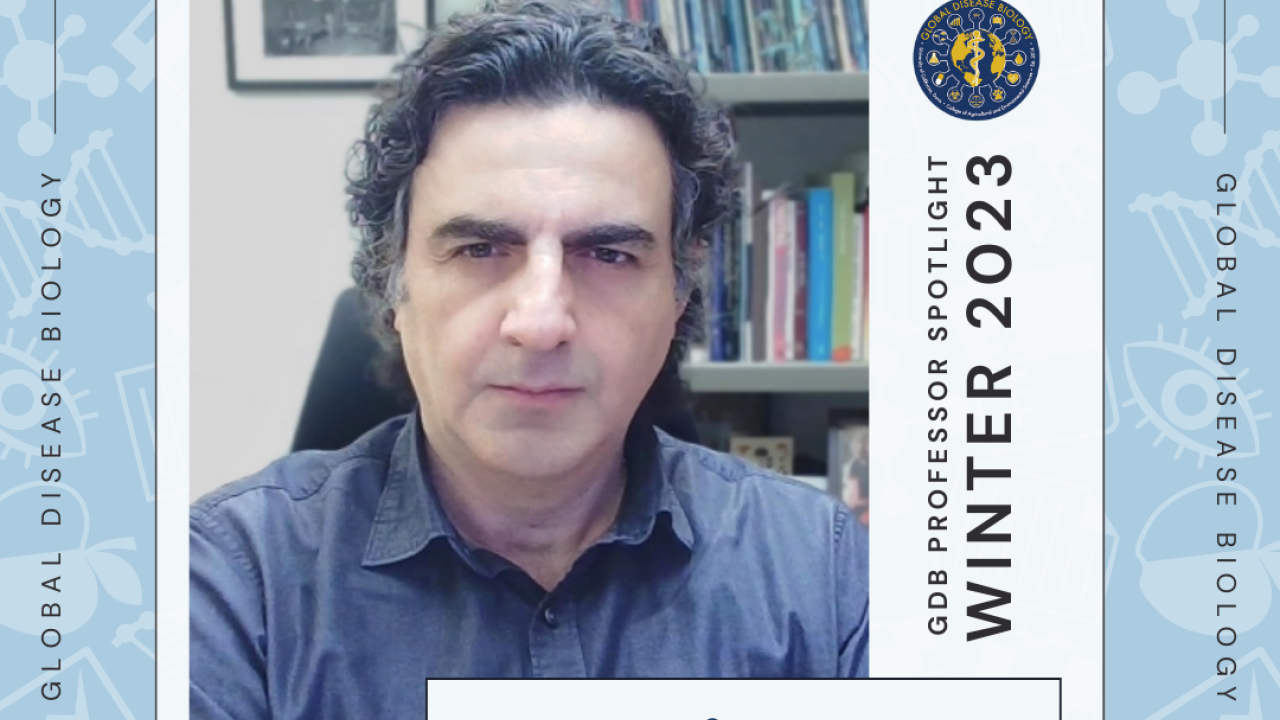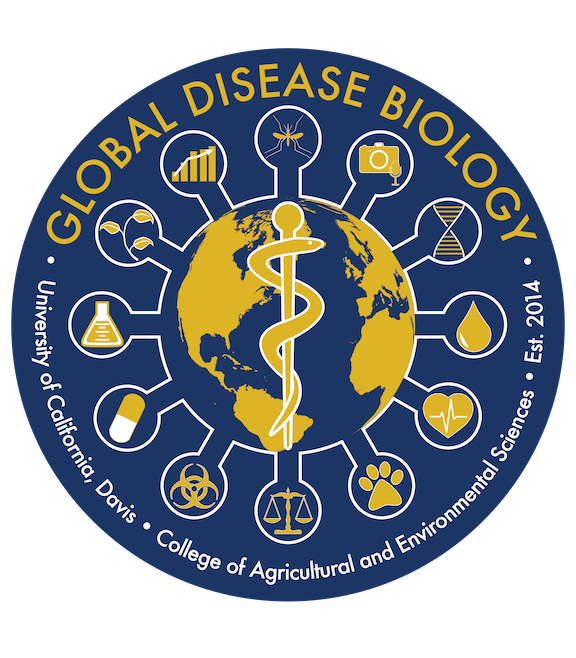
Professor Spotlight, Winter 2023: Ioannis Stergiopoulos
Dr Ioannis Stergiopoulos is a professor in the Department of Plant Pathology at UC Davis who studies microbial virulence and multidrug resistance mechanisms in fungal plant pathogens. In his studies, Dr. Stergiopoulos is using a systems biology-based approach that integrates comparative and functional genomics, with molecular evolutionary analyses, and practical field work. As a UCD Professor, he teaches one of the Pathogen/Disease courses in the GDB major, PLP 130 – Fungal Biology and Disease and the graduate-level course PLP 224: Advanced Mycology (PLP 224). He also co-teaches PLP 201A “Impacts, Mechanisms & Control of Plant Disease."
How did you decide to study genetics, genomics, and plant-microbe interactions?
If I had to answer this question with one word that would be “curiosity”. I am not a
molecular biologist or a geneticist by training but it was an inner drive to understand
deeper the organisms and the systems that I was working on that originally attracted me
to these sciences. As an undergrad, I majored in Agricultural Sciences with a focus on
Plant Protection. My undergraduate core curriculum included courses in classical
genetics but nearly nothing on molecular sciences as, back in the early 90s, studies in
molecular biology were still somewhat ‘exotic’ and out of reach for many students in my
home country. I quite enjoyed in my early career days working as a plant pathologist out
in the fields but for me the question of ‘how a pathogen causes disease’ rather than
‘what disease is caused by a pathogen’ was the one that inspired me the most. And in
order to answer this question, I knew I had to acquire knowledge from several fields of
science. This is why after completing my undergraduate studies I decided to pursue a
PhD at Wageningen university in the Netherlands and join a group that did molecular
work on plant pathogens. As a graduate student, I spent long hours in the lab studying
molecular biology and genetics by myself while working in parallel in my graduate thesis
but it was worth it and I never regraded it.
How have your past experiences prepared you for working at UC Davis? Did you have any other jobs?
I always had a strong connection to agriculture and what better place to be than Davis if
you are interested in this field. Next to their everyday jobs, my parents were also small-
scale farmers and thus from a very young age I spent a lot of my time working in our
farm. As an undergraduate student, I also took several seasonal jobs at the Hellenic
Sugar Industry, where I had the opportunity to, among others, work in a lab setting and
out in the fields together with Plant Pathologists. These experiences were transformative
to me and inspired me to become a researcher. Although studying and having a full-time
job was demanding at times, I consider these experiences unique and myself fortunate
for having them.
What do you love about teaching at UC Davis?
That it keeps me engaged in learning and enhances my creativity. I love learning new
things and I’m supper excited about transmitting this knowledge to students as well.
There is nothing more satisfying knowing that what I know can be passed on to others,
who can then continue building upon that. Of course, it doesn’t always work like that but
you always hope that among the students there will be a few, some, many(!!) that will
appreciate the knowledge that is conveyed to them and be inspired by what you teach
them. I spent an enormous amount of my time preparing the slides for my lectures, and
this is often the time that I also build, reflect upon, and question my knowledge as well. I also strive to produce an end product that students can go back to and learn from it if
they need to at one point in their careers.
How have you adapted your course to the online environment?
It was a difficult period and I can’t say that I enjoyed teaching online. I was from the first
ones to teach online and there was a lot of trial and error involved. The worst thing for
me was not being able to have an eye contact with my students or jump between the
slides and the whiteboard when I needed to. I tried notepad and a few other things but
nothing beats the sensation of writing on the whiteboard and the vitality of a classroom.
How have you adapted to being back in-person?
Almost immediately. Thank God the Zoom days are over (hopefully)!
Outside of being a professor, what are some hobbies you enjoy right now?
I am a self-professed portrait and nature photographer or ‘so he thinks’ one might
arguably say. Before joining the faculty at UCD, I used to do a lot of sports, including
cycling (who doesn’t in the Netherlands) and fencing (self-professed epeeist again…),
but don’t have time for any of that anymore. Now that I think of it, I miss fencing a lot!
What would students be surprised to find out about you?
Well, some things better left untold as they say…. Anyway, I am more easy going and
comical than I might come across. In my younger years, I also served in an elite artillery
unit, where I learned to appreciate the virtues of solid training and adherence to the
basic principles of commitment, loyalty, and accountability. I also piloted a Cessna once
and, miraculously, without even crashing it to the ground. Oh, and I also flew almost next
to a dead body once in a commercial flight.
What is the best piece of advice anyone has given you?
I can’t say that there is one piece of advice that was the best but there are different
advises that were valuable to me at times, depending on the stage and circumstances
that I was in my life. I believe that advices are valuable only within a certain context and
one should exercise cautiousness using them under different circumstances. However,
there is one line from a song lyric that I found myself subconsciously quoting very often
throughout my life “There's no easy way out, there's no shortcut home”. I think that this
simple fact of life, once acknowledged, enables one to build a more positive and decisive
attitude towards life.
